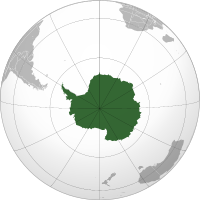
Photo from wikipedia
Antarctic biodiversity faces an unknown future with a changing climate. Most terrestrial biota is restricted to limited patches of ice‐free land in a sea of ice, where they are adapted… Click to show full abstract
Antarctic biodiversity faces an unknown future with a changing climate. Most terrestrial biota is restricted to limited patches of ice‐free land in a sea of ice, where they are adapted to the continent's extreme cold and wind and exploit microhabitats of suitable conditions. As temperatures rise, ice‐free areas are predicted to expand, more rapidly in some areas than others. There is high uncertainty as to how species' distributions, physiology, abundance, and survivorship will be affected as their habitats transform. Here we use current knowledge to propose hypotheses that ice‐free area expansion (i) will increase habitat availability, though the quality of habitat will vary; (ii) will increase structural connectivity, although not necessarily increase opportunities for species establishment; (iii) combined with milder climates will increase likelihood of non‐native species establishment, but may also lengthen activity windows for all species; and (iv) will benefit some species and not others, possibly resulting in increased homogeneity of biodiversity. We anticipate considerable spatial, temporal, and taxonomic variation in species responses, and a heightened need for interdisciplinary research to understand the factors associated with ecosystem resilience under future scenarios. Such research will help identify at‐risk species or vulnerable localities and is crucial for informing environmental management and policymaking into the future.
Journal Title: Global Change Biology
Year Published: 2022
Link to full text (if available)
Share on Social Media: Sign Up to like & get
recommendations!